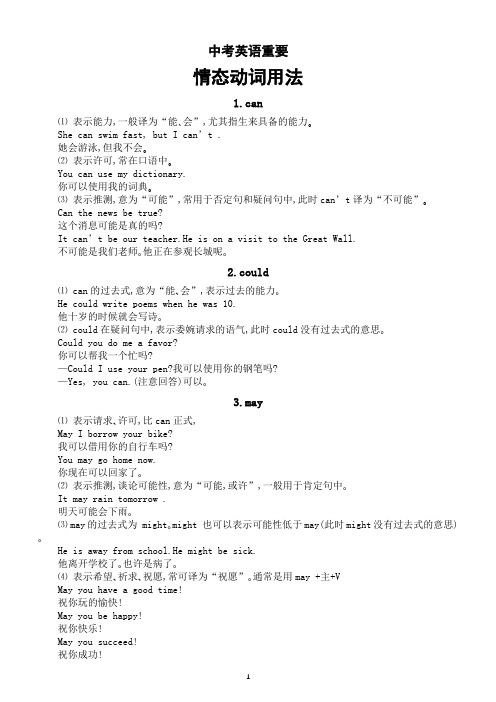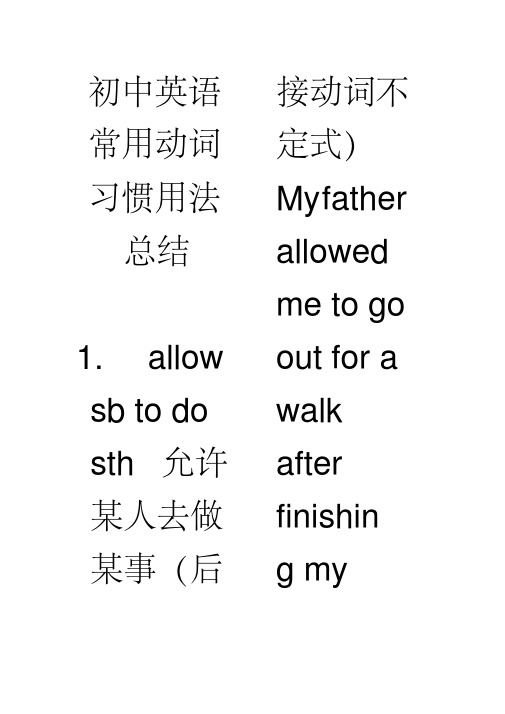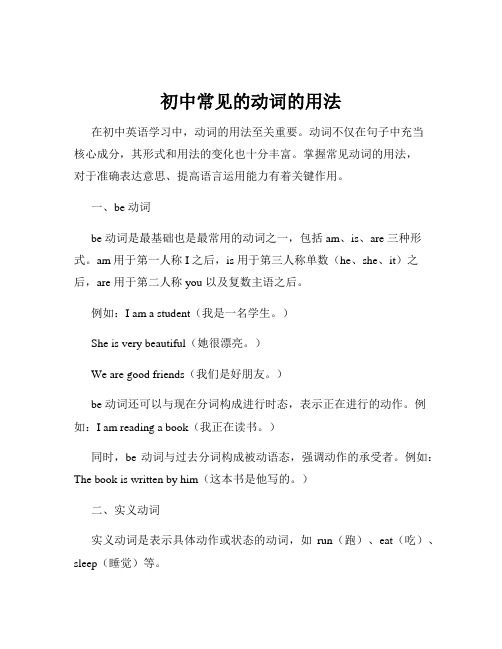初中英语动词用法总结资料
初中英语中考重要情态动词用法汇总(共10个)

中考英语重要情态动词用法1.can⑴ 表示能力,一般译为“能、会”,尤其指生来具备的能力。She can swim fast, but I can’t .她会游泳,但我不会。⑵ 表示许可,常在口语中。You can use my dictionary.你可以使用我的词典。⑶ 表示推测,意为“可能”,常用于否定句和疑问句中,此时can’t译为“不可能”。Can the news be true?这个消息可能是真的吗?It can’t be our teacher.He is on a visit to the Great Wall.不可能是我们老师。他正在参观长城呢。2.could⑴ can的过去式,意为“能、会”,表示过去的能力。He could write poems when he was 10.他十岁的时候就会写诗。⑵ could在疑问句中,表示委婉请求的语气,此时could没有过去式的意思。Could you do me a favor?你可以帮我一个忙吗?—Could I use your pen?我可以使用你的钢笔吗?—Yes, you can.(注意回答)可以。3.may⑴ 表示请求、许可,比can正式,May I borrow your bike?我可以借用你的自行车吗?You may go home now.你现在可以回家了。⑵ 表示推测,谈论可能性,意为“可能,或许”,一般用于肯定句中。It may rain tomorrow .明天可能会下雨。⑶ may的过去式为 might。might 也可以表示可能性低于may(此时might没有过去式的意思)。He is away from school.He might be sick.他离开学校了。也许是病了。⑷ 表示希望、祈求、祝愿,常可译为“祝愿”。通常是用may +主+VMay you have a good time!祝你玩的愉快!May you be happy!祝你快乐!May you succeed!祝你成功!4.must⑴ must 表示主观看法,意为“必须”。You must stay here until I come back.你必须待在这里,直到我回来。Must I hand in my homework right now?我现在必须要交作业吗?⑵ 对must引导的疑问句,肯定回答为must,否定回答为needn’t或don’t have to .—Must I finish my homework?我必须完成作业吗?—No, you needn’t.不,你不必。⑶ must也可以表示有把握的推测,意为“ 一定,肯定”,用于肯定句。The light is on, so he must be at home now.灯开着,所以他现在一定在家。⑷ 其否定形式mustn’t表示“禁止,不许”。You mustn’t play with fire.你不许玩火。You mustn’t be late.你不许迟到。注意:其反意问句的构成形式:当must表示肯定的判断、推测时,其反意疑问句要用实际问句的助动词来构成。She must have seen the film before,hasn’t she?(注意反意疑问句的后半部分)她之前一定看过这部电影,难道没有吗?You must have met uncle Wang in the shop yesterday,didn’t you?(注意反意疑问句的后半部分)你昨天一定在商店见到王叔叔了,难道没有吗?5.need⑴ need表示需要,主要用于否定句和疑问句中,其否定形式为needn’t,意为“不必”。用need提问时,肯定回答为must,否定回答为needn’t或don’t have to。—Need I stay here any longer?我需要待在这里吗?—Yes, you must .是的,你必须。—No.you needn’t /don’t have to.不,你不必。(2) need还可以作实义动词,此时有人称、数和时态的变化,如果是人作主语后边多接动词不定式。I need to do it right now.我需要现在做这件事。注意:如果是物作主语,一般用need doing与need to be done,这种情况下应注意两点:① 主动形式的动名词doing具有被动的含义;② 该动名词可以改为其动词不定式的被动形式而句子的意义不变。The door needs painting.= The door needs to be painted.门需要被油漆。6.daredare意为“敢、敢于”,用法近似于need,有两种词性:⑴ dare作为情态动词,多用于否定句、疑问句或条件句中,无第三人称单数形式,只有一般现在时和一般过去时。Dare he tell them what he knows?他敢告诉他们他知道的事情吗?I daren’t ask her.Will you do it for me?我不敢问她。你可以为我问吗?⑵ dare作为实义动词,此时有人称、数及时态的变化。He doesn’t dare to break his promise.他不敢违背承诺。注意:口语中,dare的各种形式常与不带to的不定式连用。Do you dare tell her what I said?你敢告诉她我说的话吗?7.shallshall表示征求对方意见(多用于第一、三人称)Shall we go out for a walk?我们出去散步好吗?Shall the driver wait outside?司机在外面等好吗?8.should⑴ should 意为“应该”,可表示劝告、建议、义务、责任等。We should protect the environment.我们应该保护环境。⑵ Should have done 意为”本应该做某事而没做“,表示对过去动作的责备、批评。You should have finished your homework.你本应该完成作业的。(实际上没有)9.willwill表示意愿、意志、打算,可用于多种人称。I will help you if I’m free this afternoon.如果下午有空,我会帮你的。10.had betterhad better意为“最好”,没有人称的变化,后面接不带to的不定式,其否定形式为:had better not。We had better go now.你最好现在去。。
初中英语知识归纳常用动词短语和名词短语的搭配和用法

初中英语知识归纳常用动词短语和名词短语的搭配和用法在初中英语学习中,动词短语和名词短语的正确搭配和使用是非常重要的。
本文将归纳总结一些常用的动词短语和名词短语,以帮助同学们更好地掌握它们的用法。
一、常用动词短语的搭配和用法1. take care of:照顾,照料例句:My mother always takes care of me when I am sick.(我生病时,妈妈总是照顾我。
)2. go for:喜欢,追求例句:I really go for that new movie.(我真的很喜欢那部新电影。
)3. get along with:与...相处,和...友好相处例句:She gets along with her classmates very well.(她和她的同学相处得很好。
)4. look forward to:期待,盼望例句:I am looking forward to the summer vacation.(我期待着暑假的到来。
)5. make up:编造,组成例句:He always makes up excuses for being late.(他总是为迟到编造借口。
)6. give up:放弃例句:Don't give up even when things get tough.(事情变得困难时也不要放弃。
)7. put off:推迟,延迟例句:The meeting was put off until next Monday.(会议被推迟到下周一。
)8. catch up with:迎头赶上,赶上某人例句:He ran fast to catch up with his friends.(他跑得很快,赶上了他的朋友们。
)二、常用名词短语的搭配和用法1. a piece of:一片,一块例句:Please give me a piece of paper.(请给我一张纸。
初中英语常用动词习惯用法总结

I am
was busy busy with
washing my work.
my car at 8. be
that time. coming/g
那时候我 oing/lea
正忙于清 ving/fiy
洗我的车 ing/movi
子。
ng/dying
(某些位
移动词用
进行时态 时表将 来) the bus is coming/t he dog is dying. 9. be excited to do sth
have a
afraid to
dinner
ask me
with them question
yesterday s.
.
4. be sth 害
afaid of 怕某物
doing sth He is
害怕做某 afraid of
事
snakes.
I am
6. be
afraid of amazedto
going out do sth
28.
29. get
让某人做 /have a
某事(后接 chance to
动词原形) do sth
get sb to 得到一个
do sth
做某事的
make 机会
sb do sth 30. giv
e/pass/s
how/lend /sell sb sth/sth to sb
ed in
We are
Chinese. ready for
13.
the exam.
be/get
Be ready
ready
to do sth
for/to do 为做某事
中考英语常考动词的用法

1. let sb do 让某人干某事= make sb do2. feel sb do 感觉某人做某事3.had better do 最好干……had better not do最好不干……4.Why don’t you +V原=Why not+V原为什么不干……5. will +V原didn’t+V原don’t+V原doesn’t+V原6. must 必须should 应该情态V can 能 ++V原could 能may 可以might 也许情态东西否定形式,也+V原如:can't________(sleep) mustn’t _________(go)7.W ould you please do…?你可以做某事吗?Would you please not do…?你可以不做某事吗?8. Shall we do…?我们要做某事吗?第一 first第二 second第三 third第四 fourth第五 fifth第八 eighth第12 twelfth“也”too 肯定,句末also 肯定,句中either 否定,句末Don’t swim,_________. 1. allow sb to do 允许某人干某事should be allowed to do应该被允许干某事should not be allowed to do应该不被允许干某事2. ask sb to do 让某人干某事ask sb not to do 让某人不要干某事3. tell sb to do… 告诉某人干某事tell sb not to do 告诉某人不要干某事4. invite sb to do 邀请某人干某事some advice(不加s,不可数N)一些建议6. want to do 想要干某事7. would like to do 想要干某事8. .need to do 需要干某事10.seem to do 似乎干某事11.decide to do 决定干某事12.have to do 不得不做某事13.refuse to do 拒绝做某事14.offer to do 主动干……volunteer to do 志愿做某事15.plan to do 计划干某事16.be able to do 能够干某事be unable to do 不能干….17.in order to 为了……expect to do 期望干某事wish to do 希望做某事19.what to do 干什么how to do 怎样做when to do 什么时间做去哪里……的道路make sb’s way to 前往……22.feel free to do 随便干某事23.encourage sb to do鼓励某人干某事24. a good place to do 一个干……的好地方a good way to do.. 一个干..的好方式a good time to do一个干..的好时候25. It 开头的 2个重点句型It takes +人+时间+to do句型花费某人多长时间干某事It’s+adj.+(for sb.)to do做某事对某人+形容词(做这件事对你好)It’s+adj.+of sb.to do某人做某事+形容词(你做这事真好)make it +adj+ to do.. 使干…怎么样如:make it possible to do..使干….成为可能It’s time to do…到了该做……的时候了It’s sb’s duty to do做某事是某人的责任26.Don’t forget to do 别忘记干…29.30.agree to do 同意干.……disagree to do 不同意干……努力干….try doing 尝试干……害怕干…33.warn sb to do警告某人干某事warn sb not to do34. dare to do 敢做……35. fail to do 没有成功做某事36. be+adj.+enough to do足够+形容词做某事37. sb.is ready to do某人准备好做某事38. prefer to do A ratherthan B 宁愿做A而不愿做B对比:prefer doing A to doing B比起做B,更喜欢做A39.have nothing to do with与某事无关40. the first thing to do第一件要做的事……the+序数词+N+ to do第…个干……的……41. add to do 补充做某事42.urge sb to do催促某人做某事cate sb to do教育某人做某事44.order sb to do命令某人做某事45. happen to do 碰巧做某事46.lead sb to do领导某人做某事47. have an opportunity todo 有机会做某事48. be sure to do一定会做某事1. be always doing 总是干某事2. be busy doing 忙于干某事 对比 :be busy with sth 忙于某事 3. enjoy doing 喜欢干某事 4. like doing 喜欢干某事 love doing 喜爱干某事 5. feel like doing 想要做…… 6. 对比 would like to do 7. keep doing 一直干某事 (kept 过-kept )keep sb doing 使某人一直做某事8. keep on doing 坚持干某事waste time doing 浪费时间干某事 9.stop/keep/prevent …from doing 阻止某人做某事9. finish doing 完成干某事 10. mind doing 介意干某事don ’t mind+doing 不介意干… can’t stand doing 不能忍受干… can't help doing 情不自禁干……11.… 12.(spend--spent 过-spent )花……干某事.对比:spend …on +N in 可以省略,on 不可以省略 13. have problems (in )+doing ==have difficulties (in )+doing干……有问题havetrouble doing 做某事有困难 12.succeed in doing 成功干某事of ;up 往下;沿着 before 反对;靠着如:be interested in doing 对……感兴趣be good at doing 擅长于干…How about doing ==What about doing干……怎么样?thanks for doing 因…而感谢 Thanks for helping me.谢谢你帮我.=Thanks for your help me.14. to 竟然为介词时,4个不正常的词组如下:期望干某事pay attention to doing 注意干… stick to doing 坚持干某事习惯于干某事used to do 过去常常干某事 15. be willing to do 乐意干某事 16.take up doing 从事干某事 end up doing 以做某事结束 give up doing 放弃做某事 17. avoid doing 避免干某事 18.consider doing 考虑干某事19.be afraid of doing 害怕做某事20. do some cooking/cleaning/ reading/shopping/washing做点饭/打扫一下卫生/读点书/逛逛街/洗洗衣服21. go swimming/fishing/ shopping/skating/boating去游泳/钓鱼/ 逛街/滑冰/划船 22. have fun doing 很开心做某事23. waste time/money doing浪费时间或金钱做某事24. instead of doing 代替做某事对比: instead+句子 25. miss doing 错过做某事 26. hold on to doing 坚持做某事27. suggest doing 建议做某事 28. put off doing 推迟做某事 29. succeed in doing 成功做某事30. prefer doing A to doing BB ,更喜欢做Aprefer to do A ratherthan B 宁愿做A 而不愿做B1.be+adj; stay+adj; keep+adj; feel+adj 。
初中英语动词适当形式总结

初中英语动词适当形式主要涉及一般现在时、一般过去时、现在进行时、现在完成时等时态,以及动词的第三人称单数形式、过去式、过去分词等。
1.一般现在时:基本形式是动词原形,如work,study,go等。
如果主语是第三人称单数,比如he/she/it,动词后面要加-s或-es。
例如,he works,she studies。
2.一般过去时:用动词的过去式,如worked,studied,went等。
常用的时间状语包括yesterday,last night,two days ago等。
3.现在进行时:结构是be动词(am/is/are)+动词的现在分词,如working,studying,going等。
表示现在正在进行的动作或存在的状态。
4.现在完成时:基本形式是have/has+过去分词,如have/has worked,have/has studied等。
表示过去发生的动作对现在造成的影响或结果。
此外,还有动词的第三人称单数形式、过去式、过去分词等变化规则。
例如,一般的动词在后面加-s或-es,以o 结尾的动词加-es,以ch/sh/s/x结尾的动词加-es等。
以上内容仅供参考,建议查阅英语语法书籍或咨询英语老师以获取更全面和准确的信息。
初中英语知识点归纳动词和动词的搭配用法

初中英语知识点归纳动词和动词的搭配用法初中英语知识点归纳:动词和动词的搭配用法动词是英语语法中的重要组成部分,通过不同的动词搭配,我们可以表达不同的意义和强调。
在初中英语学习中,掌握动词及其搭配用法是提高语言表达能力的关键。
本文将对初中英语中常见的动词及其搭配用法进行归纳总结。
1. 一般动词的基本用法一般动词指的是不需要加上其他助动词或情态动词的动词,如go (去)、learn(学习)、eat(吃)等。
这些动词在句子中常用作谓语动词,表达主语的动作或状态。
例句:- I go to school every day.(我每天去学校。
)- They learn English in the evening.(他们晚上学习英语。
)- She eats fruit for breakfast.(她早餐吃水果。
)2. 动词+副词的搭配用法副词可以强调或修饰动词的动作或状态,常放在动词之后。
常见的动词+副词搭配用法有:look after(照顾)、give up(放弃)、turn on (打开)等。
例句:- My sister looks after our pet dog.(我妹妹照顾我们的宠物狗。
)- Don't give up easily.(不要轻易放弃。
)- Please turn on the lights when you enter the room.(进入房间时请打开灯。
)3. 动词+介词的搭配用法介词能够与动词形成固定搭配,表达特定的意义。
常见的动词+介词搭配用法有:listen to(听)、belong to(属于)、look for(寻找)等。
例句:- We often listen to music in our free time.(我们在空闲时间经常听音乐。
)- This book belongs to me.(这本书是我的。
)- I am looking for my keys.(我在找我的钥匙。
知识点初一常用动词用法总结

知识点初一常用动词用法总结初一常用动识点总结知识点1:动词的基本形式动词是一个句子中最主要的成分,用来表示动作或状态。
动词的基本形式指的是动词原形,常以动词原形作为主语、谓语或宾语。
知识点2:动词的时态动词的时态主要分为简单时态、进行时态和完成时态。
1. 简单时态a) 一般现在时:表示经常性、习惯性的动作或状态,常与副词always、often、usually等连用。
例句:I often go to the park on weekends.(我经常在周末去公园。
)b) 一般过去时:表示过去某个时间发生的动作或存在的状态。
例句:She watched a movie yesterday.(昨天她看了一部电影。
)c) 一般将来时:表示将来即将发生的动作或存在的状态。
例句:We will have a party next week.(下周我们将举办一场派对。
)2. 进行时态a) 现在进行时:表示现在正在进行的动作。
例句:She is playing basketball now.(她正在打篮球。
)b) 过去进行时:表示过去某个时间正在进行的动作。
例句:They were studying English at that time.(他们那时正在学习英语。
)c) 将来进行时:表示将来某个时间正在进行的动作。
例句:I will be sleeping when you arrive.(当你到达时,我将会正在睡觉。
)3. 完成时态a) 现在完成时:表示过去发生的动作对现在造成的影响或仍然持续的状态。
例句:He has finished his homework.(他已完成作业。
)b) 过去完成时:表示过去某个时间之前已经完成的动作。
例句:She had already left when I arrived.(当我到达时,她已经离开了。
)c) 将来完成时:表示将来某个时间之前已经完成的动作。
例句:I will have read the book by tomorrow.(到明天前,我将会读完这本书。
初中常见的动词的用法

初中常见的动词的用法在初中英语学习中,动词的用法至关重要。
动词不仅在句子中充当核心成分,其形式和用法的变化也十分丰富。
掌握常见动词的用法,对于准确表达意思、提高语言运用能力有着关键作用。
一、be 动词be 动词是最基础也是最常用的动词之一,包括 am、is、are 三种形式。
am 用于第一人称 I 之后,is 用于第三人称单数(he、she、it)之后,are 用于第二人称 you 以及复数主语之后。
例如:I am a student(我是一名学生。
)She is very beautiful(她很漂亮。
)We are good friends(我们是好朋友。
)be 动词还可以与现在分词构成进行时态,表示正在进行的动作。
例如:I am reading a book(我正在读书。
)同时,be 动词与过去分词构成被动语态,强调动作的承受者。
例如:The book is written by him(这本书是他写的。
)二、实义动词实义动词是表示具体动作或状态的动词,如run(跑)、eat(吃)、sleep(睡觉)等。
1、及物动词与不及物动词及物动词后面必须接宾语,才能完整表达意思。
例如:I eat an apple(我吃一个苹果。
)“eat”是及物动词,“apple”是宾语。
不及物动词后面不需要接宾语就能表达完整的意思。
例如:Heruns fast(他跑得很快。
)“run”是不及物动词。
2、动词的时态一般现在时:表示经常发生的动作或存在的状态。
主语是第三人称单数时,动词要加“s”或“es”。
例如:He studies hard(他学习努力。
)一般过去时:表示过去发生的动作或存在的状态。
动词通常变为过去式,规则动词加“ed”,不规则动词有特殊的变化形式。
例如:I played basketball yesterday(我昨天打篮球了。
)现在进行时:表示正在进行的动作,由“be 动词+现在分词”构成。
例如:They are playing football now(他们现在正在踢足球。
- 1、下载文档前请自行甄别文档内容的完整性,平台不提供额外的编辑、内容补充、找答案等附加服务。
- 2、"仅部分预览"的文档,不可在线预览部分如存在完整性等问题,可反馈申请退款(可完整预览的文档不适用该条件!)。
- 3、如文档侵犯您的权益,请联系客服反馈,我们会尽快为您处理(人工客服工作时间:9:00-18:30)。
初中英语高频动词用法汇总2017-01-05期末考试马上就到了,当同学们每次遇到选填to do, doing 还是do 形式的题目时,脑海中的反应大概都是“to do 好像通,不对,应该是doing,还是填原形do 呢”?下面这些初中阶段高频出现的一些动词用法,让你从此告别看到to do, doing, do 就一脸懵的囧状。
加to do 的高频考察动词1. afford to do 负担的起做某事We can’t afford to make any mistakes.我们承担不起任何失误。
2. agree to do 同意做某事Do you agree to have dinner today? 今天你同意一块吃饭吗?3. choose to do 选择做某事Why do so many choose to leave their country? 为什么有这么多人要离开祖国?4. decide to do 决定做某事She decided to accept the offer. 她决定接受这一提议。
5. expect to do 期待做某事The shop expects to make more money this year. 这家店铺期望今年多赚点钱。
6. hope to do 希望做某事I hope to see you again sometime next year. 我希望明年某一时候再见到你。
7. hurry to do 急忙做某事We shall have to hurry to get there in time. 我们将不得不及时赶到那。
8. manage to do 设法做成某事How do you manage to do such a thing? 你是怎么设法做这样的事?9. plan to do 打算做某事Where do you plan to spend your holiday? 你打算去哪里度假?10. prefer to do 宁愿做某事I prefer to travel in the front of the car. 我宁愿坐在汽车的前面。
11. refuse to do 拒绝做某事I refuse to answer that question. 我不愿回答那个问题。
12. seem to do 看似做了某事The books seem to be lost. 那些书好像不见了。
13. wish to do 希望做某事I wish to talk with you in private. 我希望能私下里同你谈话。
14. want to do 想要做某事Is that why you don't want to go home? 这就是你不想回家的原因吗?15. would like to do 想要做某事I would like to have a word with you. 我想同你说句话。
加sb to do 的高频考察动词1. allow ab. to do 允许某人做某事My boss doesn't allow me to use the telephone. 老板不许我使用电话。
2. cause ab. to do 导致某人做某事The beliefin god causes people to do good. 对上帝的信仰使人行善。
3. encourage sb. to do 鼓励某人做某事Peter, my English teacher, never fails to encourage us to study hard. 我的英文老师彼得总是鼓励我们要好好用功。
4. force sb. to do 强迫某人做某事No power on earth could force me to do it. 谁也不能强迫我做这事。
5. invite sb. to do 邀请某人做某事We invite her to have Thanksgiving dinner with us. 我们邀请她和我们一起吃感恩节晚餐。
6. teach sb. to do 教某人做某事It is time for somebody to teach you to behave yourself. 该是有人教你应对进退之礼仪的时候了。
7. warn sb. to do 警告某人做某事The police warn us not to go out at night. 警察告诫我们夜间不要出门。
8. …enough to do 足够做某事Would you be kind enough to take a message to him? 拜托您捎个信儿给他。
9. It’s + adj+ for sb. to do 对某人来说做某事很...Is it necessary for me to attend the meeting?我真的必须参加这个会议吗?10. It takes sb. some time to do 花费某人多长时间做某事How long does it take to go to the airport by taxi? 坐出租汽车去飞机场要多长时间?后加doing 的高频考察动词1. avoid doing 避免做某事Avoid crossing this street at rush hours. 避免在交通拥挤时间穿越这条街道。
2. consider doing 考虑做某事Would you consider working in New York next year? 明年你考虑到纽约工作吗?3. enjoy doing 享受做某事I enjoy singing, much more listening to music. 我喜欢唱歌,更不用说听音乐了。
4. finish doing 结束做某事It took us a whole week to finish painting the home. 我们花了整整一星期的时间才把房子粉刷好。
5. hate doing 讨厌做某事The boys hate doing homework on Sundays. 男孩们讨厌在星期日做家庭作业。
6. imagine doing 想象做某事I can't imagine living with a drunk. 我想象不出与一个醉汉生活在一起的情形。
7. keep doing 持续做某事Foreign words keep coming into English. 外来词源源不断地进入英语。
8. mind doing 介意做某事Would you mind stepping aside to let me pass? 你介意站开让我走过去吗?9. practice doing 练习做某事Practice throwing the ball into the net. 练习投篮。
10. regret doing 后悔做某事I believe you will regret leaving Paris. 我相信你会为离开巴黎而后悔的。
11. risk doing 冒险做某事I don’t think they will risk holding an election.我想他们是不会冒风险举行选举的。
12. suggest doing 建议做某事I suggested going for a walk. 我建议去散步。
13. be worth doing 值得做某事He'll probably say no, though it's worth trying. 他很可能不同意,但不妨去试探一下。
14. spend…doing 花费...做某事How much time do you spend practicing English every day? 你每天花多少时间练习英文?15. while/when doingI like to listen to music while running. 我喜欢一边跑步,一边听音乐。
16. have a good time/fun/problems/trouble/difficulty doing 做某事有乐趣/问题/麻烦/困难I have difficulty remembering names. 我不易记住人名。
17. prevent/stop/keep…from doing 阻止...做某事Nothing can prevent him from going. 什么都不能阻止他前往。
加to doing 的高频考查动词1. prefer doing to doing 宁愿做...不愿做...Their teacher prefers doing to talking. 他们的老师喜欢做而不喜欢说。
2. be used to doing 习惯做某事I'm not used to doing shopping online. 我不习惯于网上购物。
3. look forward to doing 期待做某事I look forward to being alone in the house. 我盼望着能自己一人待在这所房子里。
4. pay attention to doing 注意力集中在做某事上You should pay attention to picking your words . 你应该注意措词。
5. devote … to doing 奉献...去做某事I devote myself to helping the poor. 我致力于帮助穷人。
加to do = 加doing 的高频考察动词1. start to do =start doing 开始做When did you start to learn English? 你何时开始学英语的?2. learn to do = learn doing 学着做She is learning to play the piano. 她在学弹钢琴。
3. continue to do = continue doing 继续做Bread continues to rise in price. 面包的价格继续上涨。
加to do ≠ 加doing 的高频考察动词1. forget to do 忘记要做Don't forget to leave room for our teacher.forget doing做了某事而把它忘记了2. remember to do 记得要做remember doing 记得做过3. need to do 需要做need doing 需要被做4. stop to do 停下来开始做stop doing 停止正在做的事中国历代版图(清晰美图)夏夏朝活动的主要区域是黄河中下游一带(相当于今山西、河南、河北地区),都城建于安邑。
